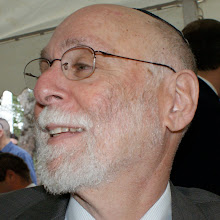

The graves of Aaron Zebi Friedman and Rebecca Liberman Friedman can be found in the Salem Fields Cemetery in the Cypress Hills neighborhood of Brooklyn, New York. They are located in the "Beth HaMedrisch Breuder des Bundes" section which is along Jamaica Avenue adjacent to the cemetery office.
Salem Fields is a beautifully landscaped memorial park, well-known for its architecturally notable mausoleums housing the remains of some of the wealthiest and well-known New York German-Jewish families of the last two centuries, including Guggenheims, Shuberts, Lewisohns, Marshalls, Warburgs, and many others. In contrast our Aaron and Rebecca are resting in modest plots marked by simple headstones.
Unfortunately much of Aaron's epitaph has been eroded away by a century-and-a-half of rains. What can be clearly read is his name in English at the top
AARON ZEBI FRIEDMAN. After four unreadable lines (which may well have included his Hebrew name followed by a reference to his authorship of Tuv Taam), is a vertical acrostic. Except for the last line of the acrostic, only the bold initial letters survive, spelling – in three columns from top to bottom –
Aharon Tzvi ben Reb Yaakov Shalom Friedmann. What faded away are the verses which likely described something about his life and character. The last horizontal line of the acrostic survives and reads:
My soul is with [G-d’s] love – Among the stars – Guarding the wisdom [of Torah]. Below that appear the words:
“His soul ascended to G-d on Sunday, the 12th of Iyar.” The year (5736 or 1876) is expressed numerologically as a modification of a verse in the Torah – Deuteronomy 33:19 – which results in: There the righteous [ritual] slaughterers will slaughter" (A reference to Aaron Zebi Friedman’s service as a shochet.) The acronym at the bottom stands for: May his soul be bound up in the bonds of everlasting life. Thankfully the epitaph of our great-great grandmother Rebecca was made of a more weather-resistant stone and is completely readable. The very moving Hebrew may be translated as:
Here lies the woman, Mrs. Rivka, daughter of Rabbi Yaakov of blessed memory, wife of Reb Aharon Tzvi Friedman, who died on Sunday, the 23rd of Marcheshvan 5626 [1865]. Alas! Sudden, cruel death, you came with frightening haste. You darkened the sun at noon. You struck down this mother of babes and sucklings, and you did not ask if she were old or tender in years. Woe is me! The whimpering of the children: “Come, let us wail on the field of tears, on the grave of our mother who has gone forever, She who would scurry to protect us as the apples of her eye. We have not merited that she raise us up to the chuppah and good deeds.” Accept her soul in the bonds of everlasting life in peaceful rest among the righteous, by the decree of G-d the merciful king. May her soul be bound up in the bonds of everlasting life.

 The graves of Aaron Zebi Friedman and Rebecca Liberman Friedman can be found in the Salem Fields Cemetery in the Cypress Hills neighborhood of Brooklyn, New York. They are located in the "Beth HaMedrisch Breuder des Bundes" section which is along Jamaica Avenue adjacent to the cemetery office.
The graves of Aaron Zebi Friedman and Rebecca Liberman Friedman can be found in the Salem Fields Cemetery in the Cypress Hills neighborhood of Brooklyn, New York. They are located in the "Beth HaMedrisch Breuder des Bundes" section which is along Jamaica Avenue adjacent to the cemetery office.

